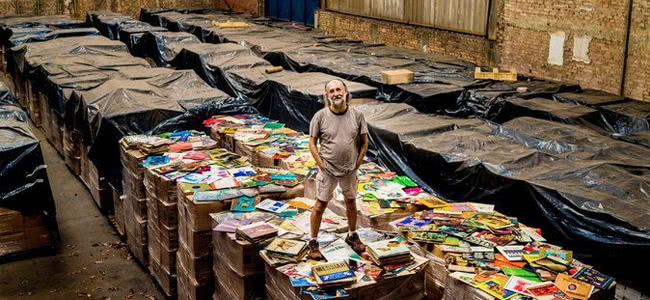Last month we introduced you to Zero Freitas, a 62-year-old Brazilian bus line magnate who has been using his fortunes to feed a life-long vinyl buying compulsion to build the world’s biggest record library.
Remember Paul Mawhinney, the Pittsburgh resident who was trying to sell one of the world’s biggest vinyl collections but couldn’t find a buyer? Freitas bought it.
[include_post id=”338457″]
In fact, Freitas’ collection is so large that he can only estimate that he owns “several million albums,” even employing a team of college interns to catalogue and sort through his gargantuan assortment of LPs. It started when he was a child, but by the team he was nearly 40, his compulsion had let to the dissolution of his marriage, meaning growing his vinyl library became his number one priority besides his business.
In recent years however, Freitas has gone on a veritable spending spree, shipping in an avalanche of titles that the aforementioned team of a dozen interns catalogue (by artist, title, release, and label), working through around 500 LPs a day.
Now CNN have gone inside the warehouses of his vinyl collection, and give us a sneak peak into what may become one of the most important musical archives in the world.
Among his treasure trove is 100,000 records from Cuba – which is estimated to be about every single album ever recorded in the country. Significant given that up to a reported 80% of mid-20th century music from Cuba (along with countries like Brazil and Nigeria) has not made the leap from the vintage format onto new media, meaning that if the LPs disappear – so too does the music.
It’s this latter issue that has in recent years seen Freitas’ record fixation transform from that of an epic-scale hobbyist into a noble quest to preserve a whole history’s of music, no matter how obscure. An epiphany reached after an exchange in 2012 with New York music archivist, Bob George, who told Freitas: “What’s the good of having it [all], if you can’t do something with it or share it?”
[include_post id=”405078″]
Freitas is now preparing what was a colossal private collection into what is likely the world’s biggest public archive, a venture called the Emporium Musical, even getting federal trade authorisation from the Brazilian government to import used records as he works towards registering his non-profit Emporium.
The rabid collectors’ dream is now to bring his library to life, envisaging a sprawling vinyl haven, with turntables and listening stations for visitors to enjoy a whole history’s worth of records, while duplicates (around 30% of Freitas’ archive) will be available to check out and take home.
A Brazilian television network has also been taken on a tour of the warehouses. It’s in Portuguese and without translation, but it’s pretty cool visually regardless.




































